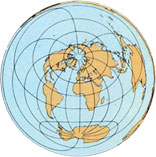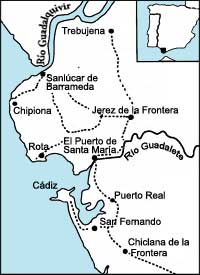
THE EDITORIAL LINE OF THE JOURNAL OF THE HISTORY OF EL PUERTO
![]() The objectives of The Journal of the History of El Puerto are as follows:
The objectives of The Journal of the History of El Puerto are as follows:
- To contribute to the scientific knowledge of the history of El Puerto de Santa María within the framework of national and universal history.
- To contribute to the scientific knowledge of national and universal histories with studies on the history of El Puerto de Santa María.
![]() The Journal of the History of El Puerto is a publication of local history of universalist character, that is to say, it conceives local history within the framework of universal history, so that it admits historical studies on El Puerto de Santa María whose perspective may be local, district, regional, national and international, as required by the issues analysed.
The Journal of the History of El Puerto is a publication of local history of universalist character, that is to say, it conceives local history within the framework of universal history, so that it admits historical studies on El Puerto de Santa María whose perspective may be local, district, regional, national and international, as required by the issues analysed.
![]() The territorial scope of the studies does not imply a parochial perspective. In other words, The Journal of the History of El Puerto is not an instrument for local vindication to be used against rival and neighbouring towns, nor is it an instrument of expression for alleged glorious traditions and local grandeur.
The territorial scope of the studies does not imply a parochial perspective. In other words, The Journal of the History of El Puerto is not an instrument for local vindication to be used against rival and neighbouring towns, nor is it an instrument of expression for alleged glorious traditions and local grandeur.
![]() The Journal of the History of El Puerto is opposed to using historiography as an instrument for the mystification of history. In order to avoid, or at least, to reduce this and other risks of distortion, the journal is open to the publication of studies concerning different historiographical backgrounds and attempts to promote historiographical debate.
The Journal of the History of El Puerto is opposed to using historiography as an instrument for the mystification of history. In order to avoid, or at least, to reduce this and other risks of distortion, the journal is open to the publication of studies concerning different historiographical backgrounds and attempts to promote historiographical debate.
![]() In accordance with the previous point, The Journal of the History of El Puerto is not responsible for the opinions expressed by the authors of the articles it publishes.
In accordance with the previous point, The Journal of the History of El Puerto is not responsible for the opinions expressed by the authors of the articles it publishes.
![]() Concerning the historiographical contents and their discourse, The Journal of the History of El Puerto is opposed to anecdotal and miscellaneous approaches, as well as descriptivism, quantitativism and mere narrativism. The historiography that The Journal of the History of El Puerto would like to transmit is based on scientific methods and theoretical approaches. As such, the journal implements strict selection criteria for its articles.
Concerning the historiographical contents and their discourse, The Journal of the History of El Puerto is opposed to anecdotal and miscellaneous approaches, as well as descriptivism, quantitativism and mere narrativism. The historiography that The Journal of the History of El Puerto would like to transmit is based on scientific methods and theoretical approaches. As such, the journal implements strict selection criteria for its articles.
![]() In short, the publication is focused on a local scope because The Journal of the History of El Puerto and its publisher understand that the history of local communities does not entirely depend on universal or national histories as if their own history were a mechanical reflection of these. We understand that each local community has its own dynamic history that is conditioned, naturally, but not determined, by various factors: belonging successively to different States, political regimes and specific socio-economic systems over time. Local communities are not independent entities (with the exception of some well-known areas and during certain periods), although they are autonomous. And local communities, no matter how small, need to be aware of their history in order to satisfy our human need in this regard, to better understand the national and universal histories and to be guided with increased prospects of success.
In short, the publication is focused on a local scope because The Journal of the History of El Puerto and its publisher understand that the history of local communities does not entirely depend on universal or national histories as if their own history were a mechanical reflection of these. We understand that each local community has its own dynamic history that is conditioned, naturally, but not determined, by various factors: belonging successively to different States, political regimes and specific socio-economic systems over time. Local communities are not independent entities (with the exception of some well-known areas and during certain periods), although they are autonomous. And local communities, no matter how small, need to be aware of their history in order to satisfy our human need in this regard, to better understand the national and universal histories and to be guided with increased prospects of success.


